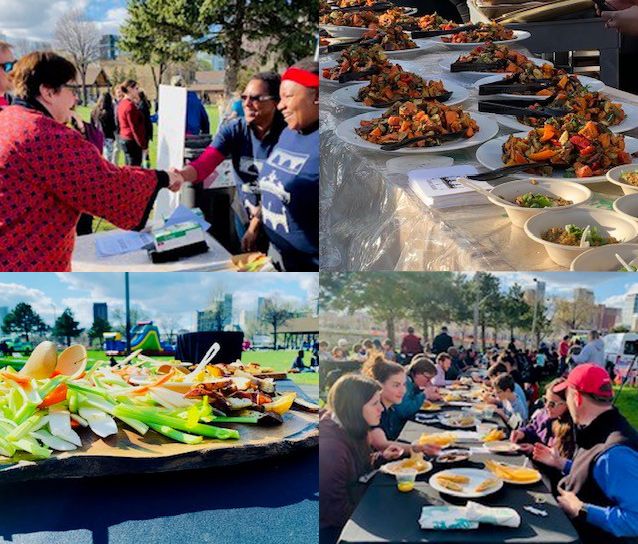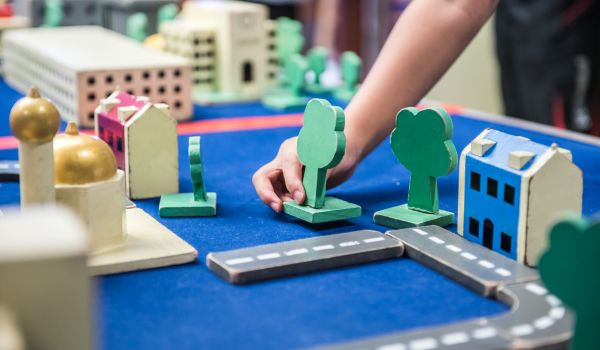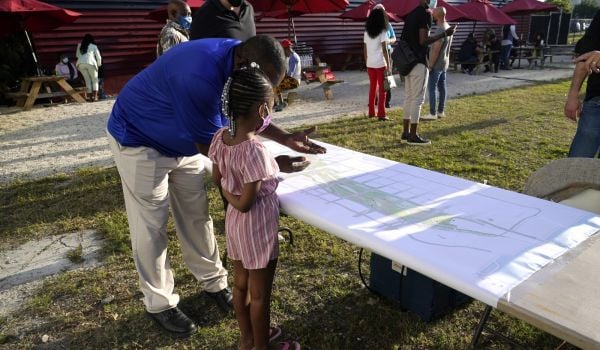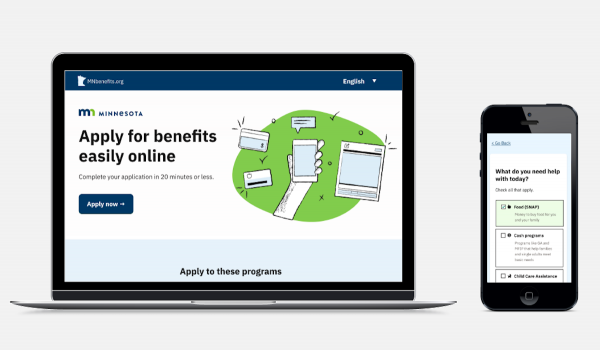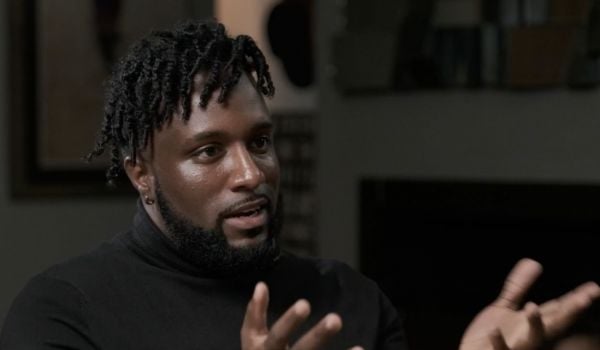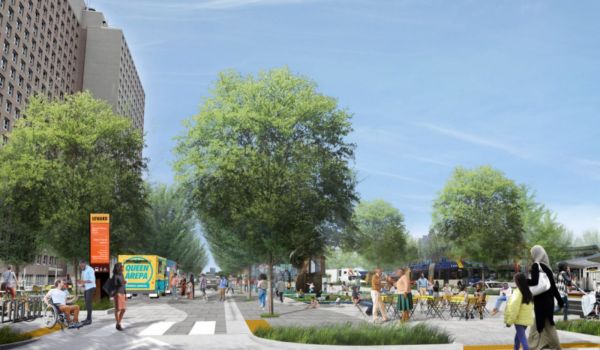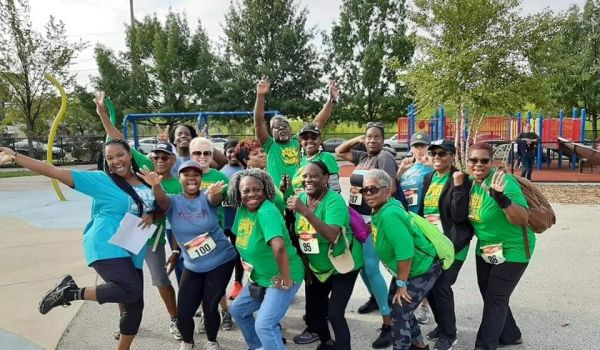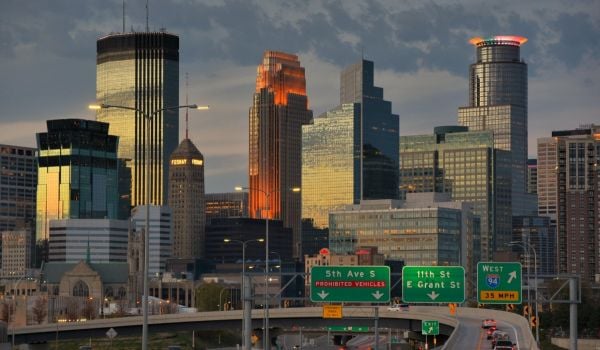After days and days of gray and rain, the clouds parted and the sun came out over Minneapolis’ Franklin Steele Park just as a diverse swath of residents, government officials, construction workers, and more sat down to a free community dinner. Rather than overlooking pristine nature or the city’s skyline, the event’s vista centered on something that most consider unsightly and avoid at all costs: the intersection of two highways near downtown Minneapolis.
No, Minneapolis doesn’t have the worst, most inexperienced event planners ever. Not only was the construction backdrop intentional, it was the impetus for the meal itself. The event was the result of a collaboration between the Minnesota Department of Transportation (MNDOT) and Eat for Equity, a local organization that hosts community feasts to bring people together.
The event, held on a bridge at the intersection of I-94 and I-35W and at an adjacent park, took the bridge theme seriously. There was bridge-themed art by local creators and even cloth napkins embellished with bridge art that guests took home at the end of the night.
This dinner was an early step in the community engagement process for MNDOT’s Rethinking I-94 project, which is designed to approach the future construction on I-94 in a more just and equitable way than its original construction was handled. Bringing community members together with government officials over food is one way that MNDOT hopes to achieve their goal.
“It was amazing. We had a great turnout. It was just phenomenal, we had so many different community members and groups from the neighborhood and surrounding communities come,” says Brenda Thomas, the project’s engagement and strategy director.
Thomas comes from a nonprofit background. “So I’m familiar with the fact that if you want to build relationships you really need to know the communities you’re working in.”
“We, as MNDOT, can’t just show up and say, ‘Hey, tell us what you think and give us your information.’ They don’t know us and don’t trust this big government agency,” she says, but getting the honest thoughts, ideas, and feedback from the community is central to the project’s success. “When people live and work and play there, they’re the most familiar with what is valuable to them. Is it access to jobs or places of worship or businesses or schools? By engaging with the community we can better understand how these transportation projects, whether they’re bridges or interstates, can allow them to have a better quality of life.”
As Thomas and her team began working on the I-94 project that focuses on a 15 mile stretch between Minneapolis and St. Paul, they talked with resident stakeholders along the route while tracking the gaps in their outreach. Several barriers, Thomas realized, from cultural customs to language and geographic location, led key populations from places like the adjacent Phillips neighborhood to be largely left out of the conversation.
Particularly mindful of the devastation that areas like St. Paul’s Rondo neighborhood experienced when I-94 was originally constructed less thoughtfully in the 1960’s, Thomas set out to do better this time, and Thursday’s community dinner was a key part of her vision of inclusivity. Citing a longstanding lack of trust as a factor, “we know that open houses and public meetings don’t work in a lot of these communities; we knew we needed to do more,” she says.
The event relied heavily on neighborhood organizations like Hope Community that already have established connections and relationships in the neighborhoods that Thomas was hoping to reach in order to bring people to the table — literally.
“Having community organizations and government agencies working together, I feel like that’s the foundation that allowed all of this to happen. The relationships they provided and the connections with local chefs — without them it would have just been empty tables overlooking a construction zone,” Thomas jokes.
“Food is a great way to bring people together,” explains Emily Torgrimson, one of the co-founders of Eat for Equity. Thanks to funding from MNDOT’s engagement budget, Torgrimson’s team was able to help the city engage with its constituents while simultaneously realizing her long-standing dream to host a meal on a bridge.
“I hope that people take this idea and, with community support, see it in their cities and their communities. I think that there’s so much that divides us right now and there are also physical objects that divide us,” Torgrimson says. “So what better way to bring people together than by sharing a meal in an unusual space and starting to build bridges to each other?”
When it comes to the future of both community engagement in Minneapolis and the I-94 project itself, Thomas has no idea what’s in store. “I want the community to tell me that,” she says.
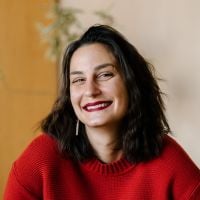
Cinnamon Janzer is a freelance journalist based in Minneapolis. Her work has appeared in National Geographic, U.S. News & World Report, Rewire.news, and more. She holds an MA in Social Design, with a specialization in intervention design, from the Maryland Institute College of Art and a BA in Cultural Anthropology and Fine Art from the University of Minnesota, Twin Cities.
Follow Cinnamon .(JavaScript must be enabled to view this email address)

